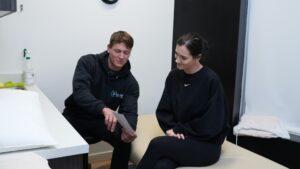About the Author
Greetings! I’m [Author Name], a dedicated physiotherapist with a focus on providing effective solutions for temporomandibular joint (TMJ) disorders. With a passion for helping individuals overcome the challenges of TMJ pain and dysfunction, I’ve had the privilege of assisting many patients in Surrey, BC, on their journey to recovery. Through this blog, I aim to share valuable insights and physiotherapy techniques tailored specifically for TMJ sufferers in Surrey, BC, to help them find relief and improve their quality of life.
Physiotherapy for TMJ Disorders: Surrey, BC Techniques and Tips
As a physiotherapist based in Surrey, BC, I’ve encountered numerous individuals struggling with the debilitating effects of temporomandibular joint (TMJ) disorders. TMJ pain and dysfunction can significantly impact one’s quality of life, affecting everything from eating and speaking to overall comfort and well-being. However, with the right TMJ physiotherapy Surrey strategies and interventions, relief is within reach. In this article, I’ll delve into the causes and symptoms of TMJ disorders, discuss effective physiotherapy techniques for TMJ pain relief, and provide guidance for individuals seeking relief in Surrey, BC.
Understanding TMJ Disorders: Causes and Symptoms
Temporomandibular joint disorders, commonly referred to as TMJ disorders, encompass a range of conditions affecting the jaw joint and surrounding muscles. The exact cause of TMJ disorders can vary, but contributing factors may include jaw injuries, arthritis, bruxism (teeth grinding), stress, or misalignment of the jaw. Symptoms of TMJ disorders may include:
- Surrey physiotherapy for temporomandibular joint disorders: Targeted interventions aimed at addressing the underlying causes of TMJ pain and dysfunction.
- Surrey TMJ pain relief physio: Techniques and exercises to alleviate pain and discomfort associated with TMJ disorders.
- Temporomandibular joint exercises Surrey BC: Specific exercises designed to improve jaw mobility, strengthen muscles, and reduce tension in the TMJ area.
- Surrey jaw pain physiotherapy: Therapeutic interventions to address jaw pain, stiffness, and limitations in jaw movement caused by TMJ disorders.
Effective Physiotherapy Techniques for TMJ Pain Relief
Physiotherapy offers a holistic approach to treating TMJ disorders, focusing on restoring optimal function and reducing pain and discomfort. Surrey TMJ physiotherapy techniques may include:
- Manual therapy: Hands-on techniques such as massage, mobilizations, and stretching to release tension in the jaw muscles, improve joint mobility, and alleviate pain.
- Therapeutic exercises: Tailored exercise programs targeting specific muscle groups involved in jaw movement, aiming to strengthen weak muscles, improve coordination, and restore normal function.
- Postural correction: Education and guidance on proper posture and ergonomics to reduce strain on the jaw joint and surrounding muscles, helping to alleviate TMJ pain and prevent further dysfunction.
- Modalities: Therapeutic modalities such as heat therapy, cold therapy, ultrasound, and electrical stimulation to reduce inflammation, promote healing, and alleviate pain associated with TMJ disorders.
Lifestyle Modifications for TMJ Pain Management
In addition to physiotherapy interventions, there are several lifestyle modifications that individuals suffering from TMJ disorders can implement to reduce pain and improve their quality of life:
- Stress management: Practice relaxation techniques such as deep breathing, meditation, or yoga to reduce stress and tension, which can exacerbate TMJ pain and dysfunction.
- Dietary modifications: Avoid hard or chewy foods that may aggravate TMJ symptoms, and opt for softer, easier-to-chew options to reduce strain on the jaw joint.
- Good oral habits: Avoid habits such as nail biting, gum chewing, or clenching the jaw, which can contribute to TMJ pain and dysfunction.
- Sleep hygiene: Maintain good sleep posture and consider using a nightguard to prevent teeth grinding and jaw clenching during sleep, which can worsen TMJ symptoms.
- Regular exercise: Engage in regular physical activity to reduce stress, improve circulation, and promote overall well-being, which can help alleviate TMJ pain and discomfort.
By incorporating these Surrey TMJ disorder treatment physio strategies and lifestyle modifications into their daily routine, individuals suffering from TMJ disorders can find relief and improve their overall quality of life.
Conclusion
In conclusion, TMJ disorders can have a significant impact on one’s quality of life, affecting everything from eating and speaking to overall comfort and well-being. However, with the right Surrey TMJ jaw exercises with physiotherapy and interventions, relief is possible. Whether through manual therapy techniques, therapeutic exercises, or lifestyle modifications, physiotherapy offers effective solutions for TMJ pain relief and improvement in function. Remember, you don’t have to suffer in silence—seeking professional help from a qualified physiotherapist is the first step toward finding relief from TMJ disorders.Next Blog Post







